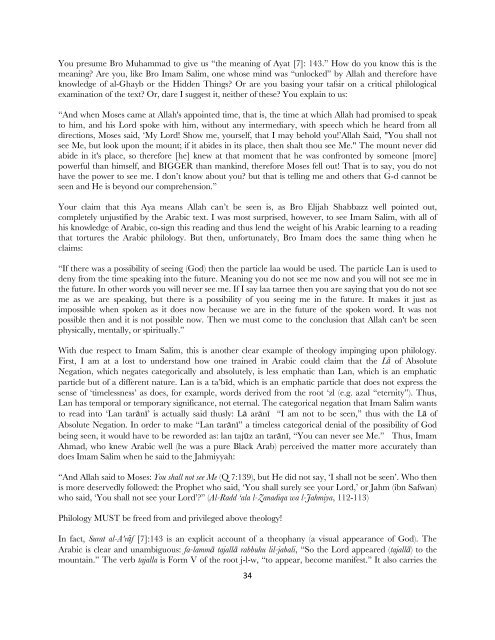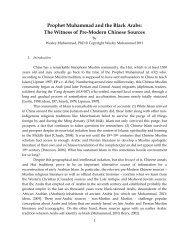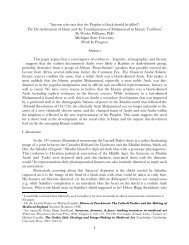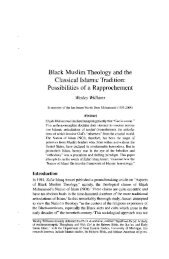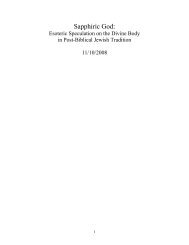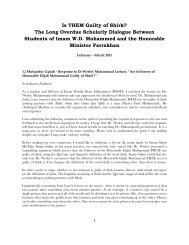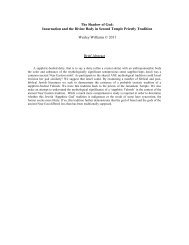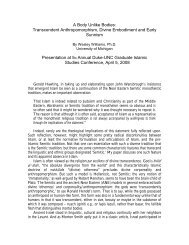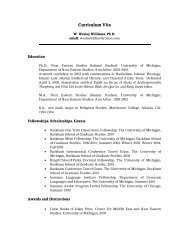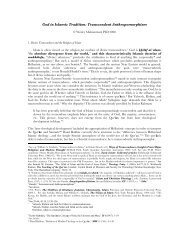Is THEM Guilty of Shirk? - Dr. Wesley Muhammad
Is THEM Guilty of Shirk? - Dr. Wesley Muhammad
Is THEM Guilty of Shirk? - Dr. Wesley Muhammad
You also want an ePaper? Increase the reach of your titles
YUMPU automatically turns print PDFs into web optimized ePapers that Google loves.
You presume Bro <strong>Muhammad</strong> to give us ―the meaning <strong>of</strong> Ayat [7]: 143.‖ How do you know this is the<br />
meaning? Are you, like Bro Imam Salim, one whose mind was ―unlocked‖ by Allah and therefore have<br />
knowledge <strong>of</strong> al-Ghayb or the Hidden Things? Or are you basing your tafsir on a critical philological<br />
examination <strong>of</strong> the text? Or, dare I suggest it, neither <strong>of</strong> these? You explain to us:<br />
―And when Moses came at Allah's appointed time, that is, the time at which Allah had promised to speak<br />
to him, and his Lord spoke with him, without any intermediary, with speech which he heard from all<br />
directions, Moses said, ‗My Lord! Show me, yourself, that I may behold you!‘Allah Said, "You shall not<br />
see Me, but look upon the mount; if it abides in its place, then shalt thou see Me." The mount never did<br />
abide in it's place, so therefore [he] knew at that moment that he was confronted by someone [more]<br />
powerful than himself, and BIGGER than mankind, therefore Moses fell out! That is to say, you do not<br />
have the power to see me. I don‘t know about you? but that is telling me and others that G-d cannot be<br />
seen and He is beyond our comprehension.‖<br />
Your claim that this Aya means Allah can‘t be seen is, as Bro Elijah Shabbazz well pointed out,<br />
completely unjustified by the Arabic text. I was most surprised, however, to see Imam Salim, with all <strong>of</strong><br />
his knowledge <strong>of</strong> Arabic, co-sign this reading and thus lend the weight <strong>of</strong> his Arabic learning to a reading<br />
that tortures the Arabic philology. But then, unfortunately, Bro Imam does the same thing when he<br />
claims:<br />
―If there was a possibility <strong>of</strong> seeing (God) then the particle laa would be used. The particle Lan is used to<br />
deny from the time speaking into the future. Meaning you do not see me now and you will not see me in<br />
the future. In other words you will never see me. If I say laa tarnee then you are saying that you do not see<br />
me as we are speaking, but there is a possibility <strong>of</strong> you seeing me in the future. It makes it just as<br />
impossible when spoken as it does now because we are in the future <strong>of</strong> the spoken word. It was not<br />
possible then and it is not possible now. Then we must come to the conclusion that Allah can't be seen<br />
physically, mentally, or spiritually.‖<br />
With due respect to Imam Salim, this is another clear example <strong>of</strong> theology impinging upon philology.<br />
First, I am at a lost to understand how one trained in Arabic could claim that the Lā <strong>of</strong> Absolute<br />
Negation, which negates categorically and absolutely, is less emphatic than Lan, which is an emphatic<br />
particle but <strong>of</strong> a different nature. Lan is a ta‘bīd, which is an emphatic particle that does not express the<br />
sense <strong>of</strong> ‗timelessness‘ as does, for example, words derived from the root ‗zl (e.g. azal ―eternity‖). Thus,<br />
Lan has temporal or temporary significance, not eternal. The categorical negation that Imam Salim wants<br />
to read into ‗Lan tarānī‘ is actually said thusly: Lā arānī ―I am not to be seen,‖ thus with the Lā <strong>of</strong><br />
Absolute Negation. In order to make ―Lan tarānī‖ a timeless categorical denial <strong>of</strong> the possibility <strong>of</strong> God<br />
being seen, it would have to be reworded as: lan tajūz an tarānī, ―You can never see Me.‖ Thus, Imam<br />
Ahmad, who knew Arabic well (he was a pure Black Arab) perceived the matter more accurately than<br />
does Imam Salim when he said to the Jahmiyyah:<br />
―And Allah said to Moses: You shall not see Me (Q 7:139), but He did not say, ‗I shall not be seen‘. Who then<br />
is more deservedly followed: the Prophet who said, ‗You shall surely see your Lord,‘ or Jahm (ibn Safwan)<br />
who said, ‗You shall not see your Lord‘?‖ (Al-Radd „ala l-Zanadiqa wa l-Jahmiya, 112-113)<br />
Philology MUST be freed from and privileged above theology!<br />
In fact, Surat al-A‟rāf [7]:143 is an explicit account <strong>of</strong> a theophany (a visual appearance <strong>of</strong> God). The<br />
Arabic is clear and unambiguous: fa-lammā tajallā rabbuhu lil-jabali, ―So the Lord appeared (tajallā) to the<br />
mountain.‖ The verb tajalla is Form V <strong>of</strong> the root j-l-w, ―to appear, become manifest.‖ It also carries the<br />
34


